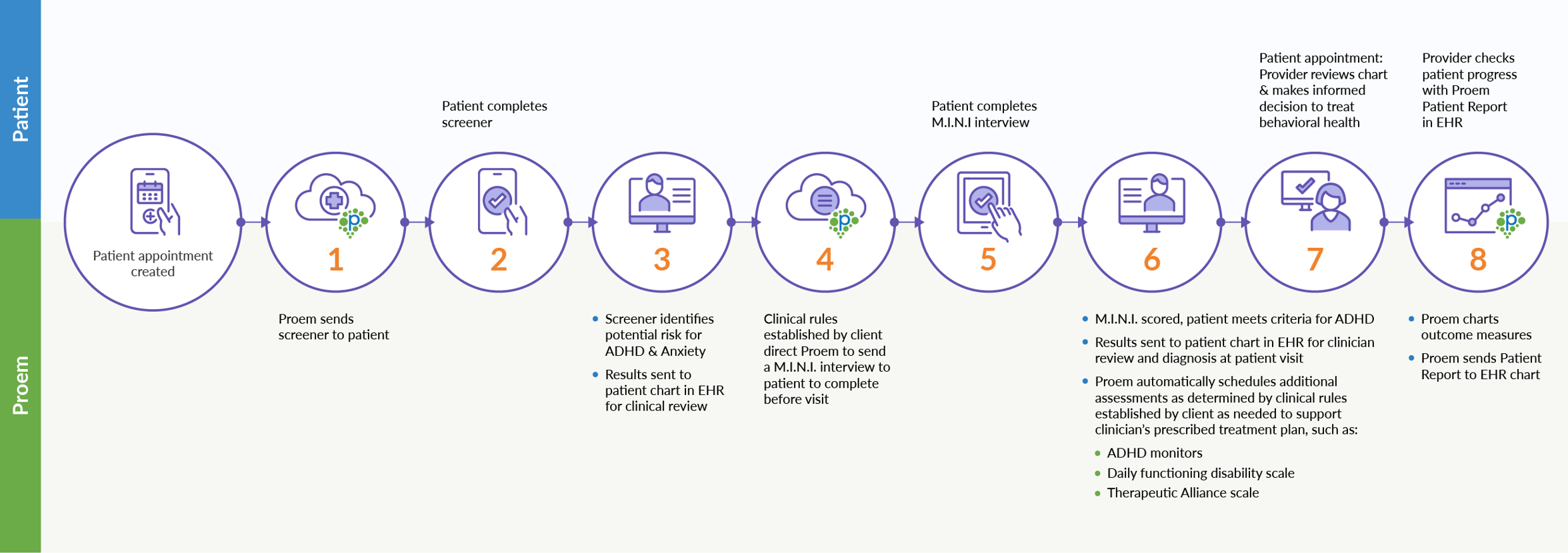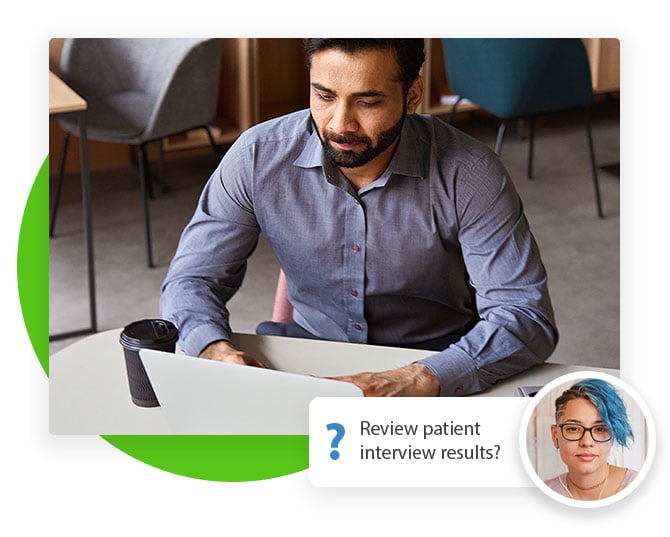Primary Care Providers
Treat mental illness with confidence.
With 30% of U.S. adults suffering from depression or anxiety and most seeking help from their primary care physicians (PCPs), the demand on primary care has skyrocketed. Managing patients with both physical and mental health issues adds up to 1.5 hours to a PCP's day, and traditional tools like PHQ-9 and GAD-7 don't assess all mental health conditions. This leaves PCPs overstretched and under-resourced.
Proem addresses these challenges by offering comprehensive digital mental health screenings and assessments that streamline the diagnostic process, enabling PCPs to confidently navigate mental health complexities so every patient receives the care they deserve.

Helping PCPs Handle their Patients' Mental Health
Let's face it – you didn't choose to specialize in psychiatry after med school, but with delays and stigma around mental health care, more patients are turning to you to care for their mental health as well as their physical health needs. Overwhelmed by the lack of time, resources, and training to address this influx? Proem is here to help.

The PHQ-9 and GAD-7 are just part of the puzzle.
Primary care providers often rely on the PHQ-9 and GAD-7 to make mental health diagnoses, but these tools only assess the symptoms of depression and anxiety. Proem completes the puzzle, offering a comprehensive, "touchless" screening and interview process for the most commonly diagnosed DSM-5 disorders. We also monitor your patients, ensuring your treatment plan is effective. And all of this can be done remotely by your patients without adding time to your already packed schedule.
See the process and touchless workflow below!

Rule out disorders and identify comorbid conditions.
Roughly half of individuals with symptoms of depression or anxiety have an underlying condition like bipolar disorder or OCD. Additionally, almost half of those experiencing depression are facing a co-occurring disorder, such as SUD or PTSD. Grasping the complexity of mental health is key for diagnosis. Proem simplifies the assessment and diagnosis process, ruling out and homing in on specific disorders for efficient and accurate treatment or referral decisions.

Integrate behavioral health for additional revenue.
The U.S. faces a severe shortage of behavioral health professionals, with half its counties lacking a psychiatrist, while mental illness rates are rising according to the latest data. To tackle this, CMS and commercial insurers are encouraging primary care physicians to fill the void with financial incentives through Behavioral Health Integration and Psychiatric Collaborative Care Management models, supported by various CPT codes for incorporating mental health services into your practice.
How It Works
4 Simple Steps to Help PCPs Deliver Proactive Mental Health Care while Minimizing Disruption
Patients complete a comprehensive electronic screener to create a mental health baseline of the most common diagnosed conditions, enabling providers to address concerns proactively before the moment of crisis.
Patients with mental health complaints and high-risk individuals complete one all-inclusive instrument online before appointments to help providers make the correct diagnosis and properly treat or triage patients.
Automated diagnosis-specific monitoring tools provide a consistent point of view and follow patient progress in symptom improvement and functional capacity. Therapeutic alliance also available.
Data from the care process is visualized on dynamic patient and management dashboards, enabling practices to demonstrate that getting the diagnosis right delivers optimal clinical and financial results.
Automated Workflow
Proem Delivers Patient Data to Support Clinical Decisions


eBook
Behavioral Health Integration in Primary Care: The Value & Revenue Opportunities
How We're Different
Breaking Through the Status Quo of Mental Health in Primary Care
When it comes to providing integrated behavioral health care, Proem makes it easier, faster and more accurate to treat your patients' mental health.
-
Gold-standard assessment tools fit within the primary care provider's workflow and can be completed remotely by patients before visiting your office.
-
Multi-dimensional screeners and assessments look beyond depression and anxiety symptoms to rule out conditions and uncover underlying and comorbid conditions.
-
Outcome monitors help primary care providers adjust medications and treatment plans that aren’t working or continue those that are working for the patients they treat.
-
Data collected at every step provides documentation needed for reimbursement of mental health services provided.

Using Proem to bill for CPT codes 96136 and 96138 has created a new revenue stream for the practice.
When it comes to evaluating individuals with complex conditions, it is important that we use evidenced-based resources such as Proem’s diagnostic interview to accurately and precisely diagnose the specific condition or conditions that are driving the behaviors or presenting concerns. The specificity of the questions and the intuitive algorithms make it ideal for the type of work we do.
Proem doesn’t replace diagnosis, but it does put me in the ballpark, so I am confident checking the differentials and making a diagnosis in 5-10 minutes.
One mission. Two ways.
At Proem Behavioral Health, our mission is to ease the pain of mental illness by helping healthcare providers and clinical researchers help more people. We do that in two ways: through our comprehensive software platform and our exclusively licensed digital mental health assessments.
The Proem Platform
Experience workflow efficiencies, consistent processes and documented outcome measures with a digital behavioral health assessment platform.
Gold-standard Measurements
Just need access to the best mental health assessment tools available to help screen, diagnose and/or monitor patients or trial/study participants?





.png)

